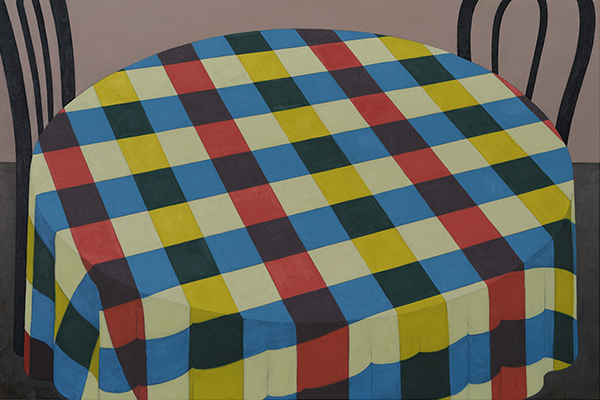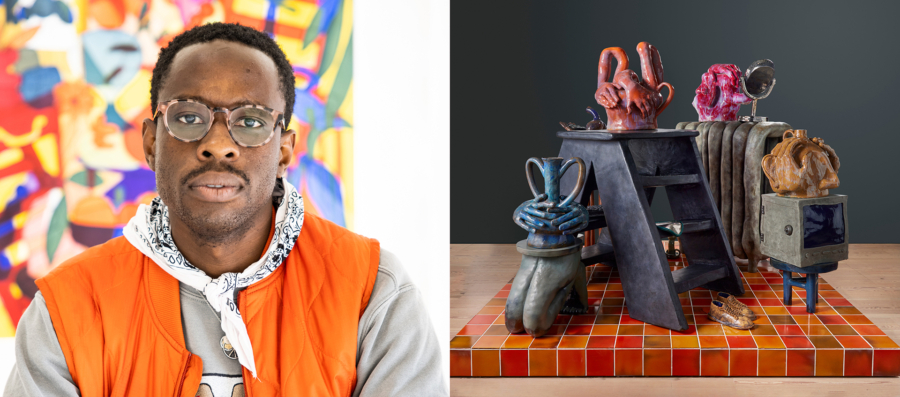November 4, 2019
Download as PDF
View on Harper's Magazine
 Paintings by Henni Alftan © The artist. Tiptoeing 1/2 (left) and The Thinker 1/2 (center left). Courtesy Karma, New York City. Landscape (center top), Pleats (center bottom), and Don’t Look Back (right). Courtesy Galerie Claire Gastaud, Clermont-Ferrand, France
Paintings by Henni Alftan © The artist. Tiptoeing 1/2 (left) and The Thinker 1/2 (center left). Courtesy Karma, New York City. Landscape (center top), Pleats (center bottom), and Don’t Look Back (right). Courtesy Galerie Claire Gastaud, Clermont-Ferrand, France
HOW HIGH? THAT HIGH
He had his stick that was used mostly to point at your head if your head wasn’t held up proudly.
I still like that man—Holger! He had been an orphan!
He came up to me once because there was something about how I was moving my feet that wasn’t according to the regulations or his expectations.
The room was a short wide room with a short wide window with plenty of artificial light.
On Holger’s say-so, the girls stayed seated and we all crossed the room to ask them to dance and to bow.
I have never doubted the logic of it, but I was surprised I acted swiftly with my hair neatly water-combed, in my suit and my tie.
I liked her—the girl I asked—and she had bread breath from rye bread, my favorite, and my elbow needed to be up, my hand placed between her waist and her shoulder blades.
And when the music stopped, I took her back to her spot like a little man of the world, with no reason to complain. I returned to the other side of the room to wait until we moved one place over to ask the next girl in the row to dance.
To this day, I keep up my ambition to meet guidelines.
Although tonight, to get to where my wife stood, I was probably stepping too quickly.
Had I made an irregular gesture—unforeseen?—because she pulled away quite thoroughly.
She said, “You always latch on to me when I am about to yawn, and now I can’t do it!” And she lifted her chin, covered her mouth, and tried again.
But after failing, she had that expression I know so well—that she is suffering, as she should, and for a better reason than I ever do.
Was she afraid of me? Why isn’t she afraid of me?
To a great extent there is great value in her sour face, still capable of awing me.
Because she was dressed for a gala, her mouth was painted red. Her eyes were lined in black, her hair curled.
What all this reminds me of is a wise saying: “Do not use the contents of an unlabeled bottle—even if you think you remember what it contains.”
One side of her face then seemed about to smile, as if she was also staring at me, smiling at me behind my back, yet nothing was funny.
I do not try to argue, reason, or fight back with a person in this state, which is so similar a state to brave, balanced, grand.
INSERTED INTO THE REST OF HER
My arm is scaly and thin and my bracelet has oblong links of fake gold. It’s not real. It’s not real, and the doctor had his admonitions for us that we kept trying to put into Willy’s words or into mine on the walk home.
Oh, what the human body can go and do on its own because there was something really awry with Willy.
We followed a group of children who were also being strongly advised. And there was no varying of the force or the pitch of the voice that was shouting at them: Don’t ever eat the berries!
I encircled Willy’s waist with my arm, but I often brood over whether I am partial enough to my husband who is very ill.
The sun was briefly out and in the gilded city air, we thought to make a stop at the Cherry Door Thrift Shop where we bought a small but heavy chest—handcrafted.
“Do you really want that?” the clerk asked. She took more pride in some practical tables that were light enough to carry.
On foot, with the help of a store hand, we got the chest home in the rain. It was a ticklish scene, decorated by toothy-edged clouds overhead, and the chest has made little atmospheric change in the world of our home.
Doctor Boondas had prescribed glyceryl trinitrate for Willy. And his nurse had waved at us and shut the door behind him when Willy went in. And then another woman cast herself forward through the door toward me.
It looked as if her head and her neck had been carved separately and then inserted into the rest of her. She had a grave aspect and the gaze of a person in a trance.
“I had one!” she shouted at me, as she pointed at and took up my wrist.
She fingered my faux good-luck piece, from which I count on powerful emanations to produce certain happy-enough results.
She said, “I gave mine to the church.”
And my ornament is common enough. I’d say one like it can be found in North America in almost every treasures-and-trash locale.
I also collect shells.
I found a plaster figurine of a Greek goddess to stand in the way of our books, to keep them from falling on their faces on the bookshelf.
I did recently give away a full-zip fleece jacket and a coffeepot percolator. Soon Willy will go.
I used to think he afforded protection. In the case of Willy—much like a dragon with a down-to-earth aura—he was especially feared and recommended.
My regard for my plaster Artemis is deeply implanted, and she can bring on a blush when I see her—a hot jealous feeling for her thin neck, heavy hairstyle, and for the glass spheres inside of her eye sockets.
MASTER OF THE BLAST
That’s how bright the sky was! A woman’s lilac dress somehow picked up greenish hues as she was chewing and chewing one biteful.
And was she even hungry as she squeezed her hands together under her chin, so that her knuckles pulsed?—as she kept on with her snapping and gouging and delving into what was both pliable and crisp.
It was not easily done—and then a boy who was with her sneezed.
“God bless you!” I said.
“Why?” the boy asked. Another one of his sneezes followed that expanded and rolled but drew no salute.
The chewer had stopped her chewing and thanked the server for offering her more coffee—coffee that I could see had strength, unexpected darkness.
And with a deep, indwelling smile, the server said, “Perfect.”
Then I coughed abruptly and the cough was a bugle-like three-parter.
There followed some barely audible drumming on a tabletop from a man who was enthusiastically engaged with the syncopations.
The woman told her boy, “Well then, I want you—” as the boy cowered and as the sound of my own tearing, with my teeth, into my toast, interfered with my hearing any more of his mother’s scolding.
It is such a challenge to express exuberances in disrupted areas.
I folded my restaurant tab in half, tore it at the center of the fold. I held it like a cigarette, then I rolled the two ends over my fingers and put my mouth to it and I blew. This didn’t work. I wasout of practice, but it needs to be flimsy paper, because then when the air strikes across the torn slot, the paper starts to vibrate in the airstream and it makes a big noise.
There! Then I did it! It’s not always one hundred percent.
SHE’LL LOVE ME FOR IT
There is a part of the sky at nightfall that she really enjoys, too, and the woman’s late father can be seen never suffering from the waist up, hanging young and bland above a sideboard in a portrait.
Just the same, this woman is bollixed by an emotional problem and it’s as if she smacks her head against the wall until blood spurts out and the color red is also vivid in the street where she lives—where an equestrian statue has been painted a pretty shade of it by vandals.
You see the woman’s health began to give way because of that emotional problem.
It doesn’t help that she eats heavily salted, dyed meat along with her eggs and irresponsible is not the right word for this.
The place in which she sleeps poorly is in the room across the passage from where she eats and we have the ability to get close to her gross movements, her ordinary life and to pick at her critically.
During lonely months the woman thought, I touched him! And we often observe this type of pining among primitive types.
I saw her grieving, but I didn’t think the world of her.
Where is her capacity for being a sly tease? For being playful?
Mind you, the portrait of her father features good flesh-painting and the technique was drawn from the methods of others—feathery touches.
What if the woman is dignified when she speaks?—and what if I am generous about her behind her back by suggesting that her structure—her long back muscles, her buttocks, shoulder blades, all of it—amount to a great domestic landmark?—gracious and picturesque—that may stand up against a headwind while she overlooks the broad expanse of a river. She’ll love me for it.
Will do.
WHAT IS GIVEN WITH PLEASURE AND RECEIVED WITH ADMIRATION?
For her, sometimes the conjugation was a haphazard intertwining, with loose swings—other times more planned and positive.
All right. Good.
Why? Because now she is a grown woman and she has had a lot of intercourse with her husband, except that she has ended the marriage.
And things nearby her may prompt a recollection or tell a story.
On her stove top, for example, an iron pot she owns has been scoured and scooped out even more than she has. And its sides meet its bottom in a wide curve to provide for efficient stirring and this pot offers her a hole of significance that is well filled with bubbles of water andwith light when the telephone rings.
“Ms. Joy M. Willums?” the caller says. “I need to get in touch with Ms. Joy M. Willums. Are you Ms. Joy M. Willums?”
She answers no and also balks at the gruel in the offing that had been headed for the hot pot.
Outside she goes alongside the river to hear horns blowing and a bell ringing and she is drawn forward—but by what?
It could be the sun appearing, as if it were a lank strand of brass wire coiling.
It lights her way, and both the sky and the river are wavy and blue and she meets a friend by chance whose hair is newly auburn.
That’s right. Her friend DeeDee Luck has topped herself off, so to speak, in a color resembling the onset of a fire and her friend is accompanied by her two small sons.
Since they are all on the ditch side of the river, the bigger boy kneels down and throws up a handful of black mud.
“Oh, Tyler!” cries his mother, when Tyler sits down in the ooze. “You always get your way!”
The boy says, “Ye-e-e-e! I get my way,” and he is slapping at the soil and then Tyler extends the range of his antics.
He obtains an easy kind of rhythm that well expresses the isolation of individual people.



